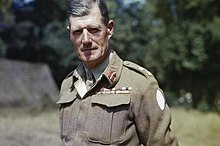John Crocker: Difference between revisions
re-categorisation using AWB |
GrahamBould (talk | contribs) mNo edit summary |
||
| Line 4: | Line 4: | ||
Upon the outbreak of the [[World War I|First World War]] Crocker enlisted as a [[Private (rank)|private]] in the [[Artists' Rifles]], a training corps for officers, before joining the [[Machine Gun Corps]] as an officer. He had a distinguished career in the war and won both the [[Distinguished Service Order]] and [[Military Cross]]. After the [[armistice]], Crocker left the army to train as a [[solicitor]]. However, he did not enjoy his new profession and decided to return to soldiering. After a short period as an [[infantry]] officer, Crocker specialised in the then new field of [[Tank|armour]] and joined the [[Royal Tank Regiment|Royal Tank Corps]] in 1923. He held a number of both field and training posts and by the time the Second World War began he was in command of 3rd Brigade attached to the [[British 1st Armoured Division|1st Armoured Division]]. |
Upon the outbreak of the [[World War I|First World War]] Crocker enlisted as a [[Private (rank)|private]] in the [[Artists' Rifles]], a training corps for officers, before joining the [[Machine Gun Corps]] as an officer. He had a distinguished career in the war and won both the [[Distinguished Service Order]] and [[Military Cross]]. After the [[armistice]], Crocker left the army to train as a [[solicitor]]. However, he did not enjoy his new profession and decided to return to soldiering. After a short period as an [[infantry]] officer, Crocker specialised in the then new field of [[Tank|armour]] and joined the [[Royal Tank Regiment|Royal Tank Corps]] in 1923. He held a number of both field and training posts and by the time the Second World War began he was in command of 3rd Brigade attached to the [[British 1st Armoured Division|1st Armoured Division]]. |
||
Crocker's brigade, like much of the [[British Expeditionary Force]], was destroyed in the retreat to [[Dunkirk]] in 1940. Upon his return to Britain, he was given a home based command, [[British IX Corps|IX Corps]], before again being sent overseas in 1943, this time to [[Tunisia]]. He was wounded in a training accident shortly after his arrival and saw little action in [[North Africa]]. He did, however, create something of a controversy when he criticised the performance of [[United States|American]] troops to the press. On his return to service he was given [[British I Corps|I Corps]], part of [[Miles Dempsey|Dempsey]]'s [[British Second Army|Second Army]], to command in |
Crocker's brigade, like much of the [[British Expeditionary Force]], was destroyed in the retreat to [[Dunkirk]] in 1940. Upon his return to Britain, he was given a home based command, [[British IX Corps|IX Corps]], before again being sent overseas in 1943, this time to [[Tunisia]]. He was wounded in a training accident shortly after his arrival and saw little action in [[North Africa]]. He did, however, create something of a controversy when he criticised the performance of [[United States|American]] troops to the press. On his return to service he was given [[British I Corps|I Corps]], part of [[Miles Dempsey|Dempsey]]'s [[British Second Army|Second Army]], to command in [[Battle of Normandy|Operation Overlord]], the [[Allies of World War II|Allied]] invasion of [[France]]. He held this post until the end of the war. |
||
After the war he held a number of commands before retiring in 1953. |
After the war he held a number of commands before retiring in 1953. |
||
Revision as of 10:07, 27 July 2006

General Sir John Tredinnick Crocker, GCB, KBE, DSO, MC (1896-1963) was a British Army officer and corps commander during World War II.
Upon the outbreak of the First World War Crocker enlisted as a private in the Artists' Rifles, a training corps for officers, before joining the Machine Gun Corps as an officer. He had a distinguished career in the war and won both the Distinguished Service Order and Military Cross. After the armistice, Crocker left the army to train as a solicitor. However, he did not enjoy his new profession and decided to return to soldiering. After a short period as an infantry officer, Crocker specialised in the then new field of armour and joined the Royal Tank Corps in 1923. He held a number of both field and training posts and by the time the Second World War began he was in command of 3rd Brigade attached to the 1st Armoured Division.
Crocker's brigade, like much of the British Expeditionary Force, was destroyed in the retreat to Dunkirk in 1940. Upon his return to Britain, he was given a home based command, IX Corps, before again being sent overseas in 1943, this time to Tunisia. He was wounded in a training accident shortly after his arrival and saw little action in North Africa. He did, however, create something of a controversy when he criticised the performance of American troops to the press. On his return to service he was given I Corps, part of Dempsey's Second Army, to command in Operation Overlord, the Allied invasion of France. He held this post until the end of the war.
After the war he held a number of commands before retiring in 1953.
References
- Biographical Dictionary of British Generals of the Second World War, Nick Smart. ISBN 1844150496.
- Crusade in Europe, Dwight D. Eisenhower. ISBN 080185668X
- D-Day 1944, Ken Ford. ISBN 1841763683.
